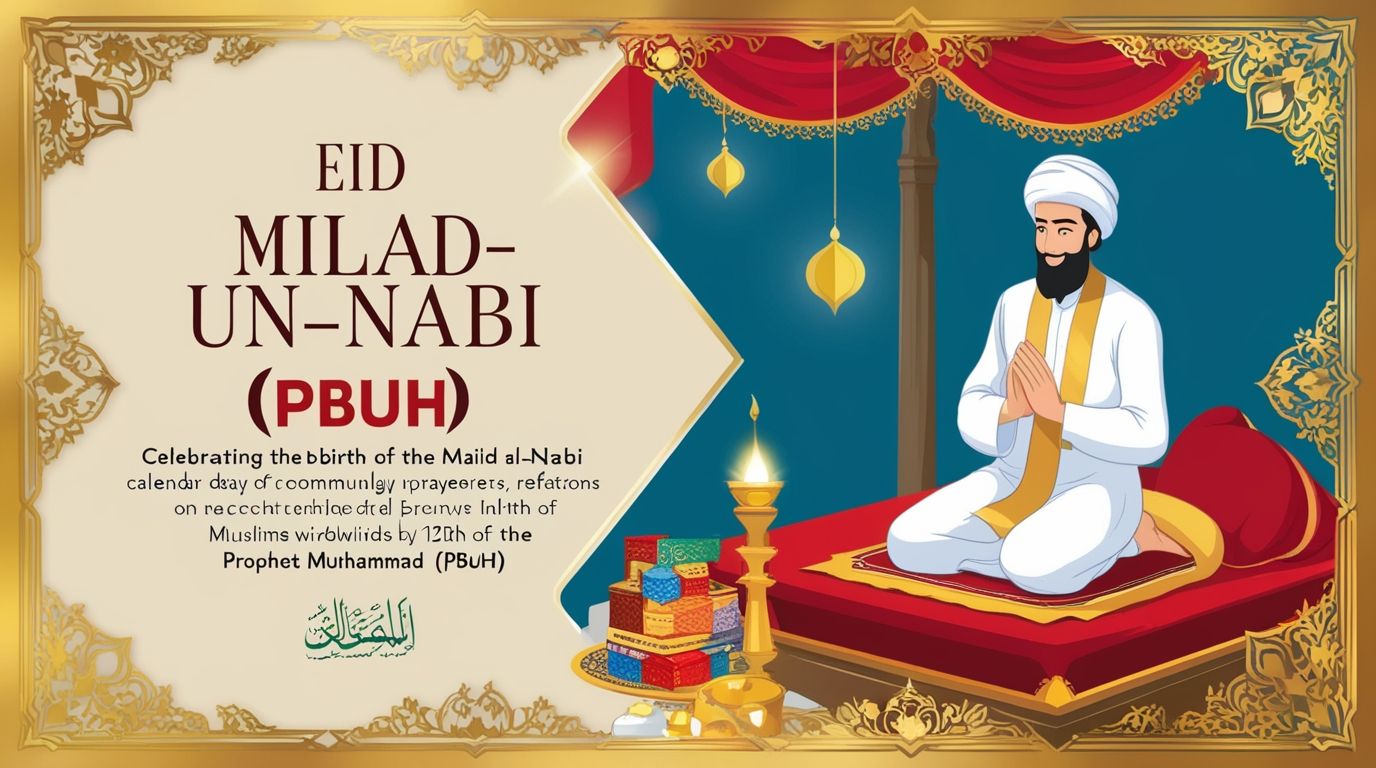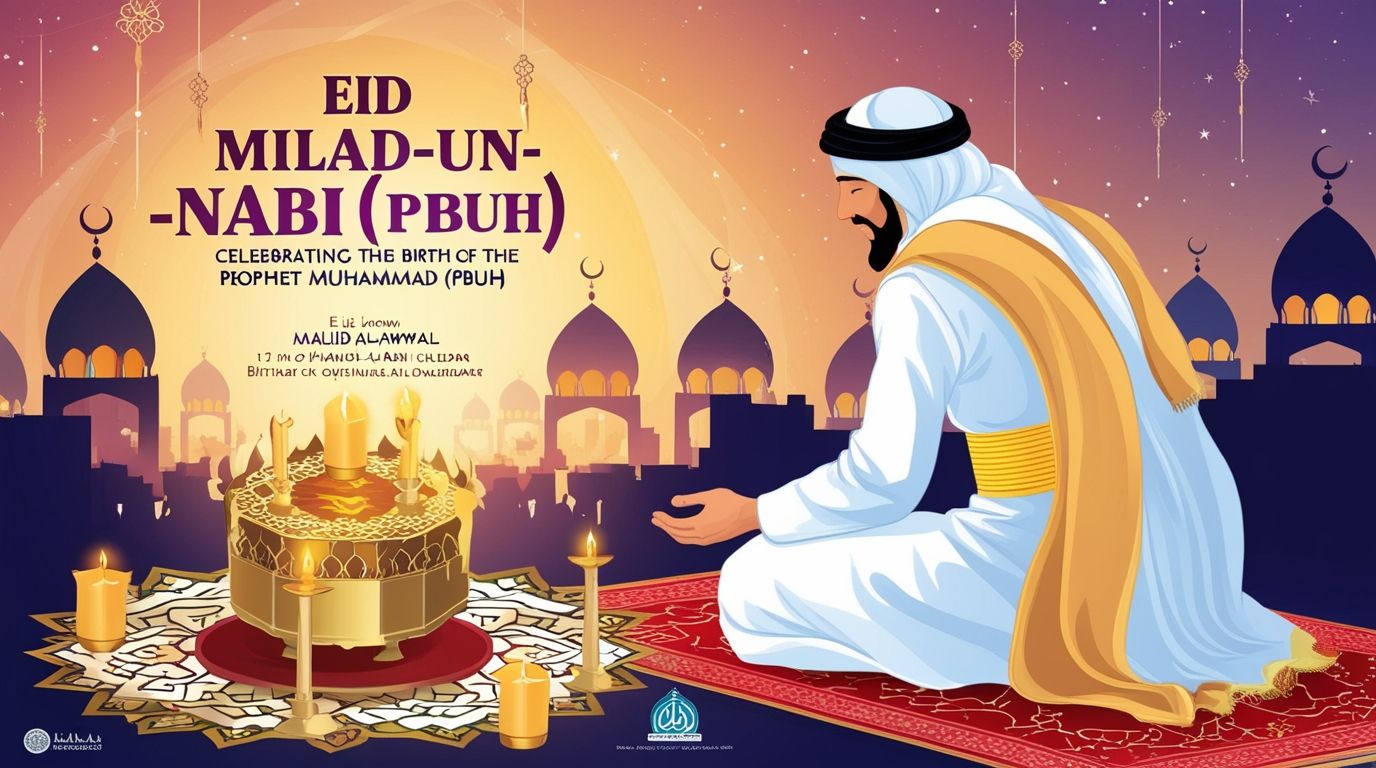Eid Milad-un-Nabi (PBUH) Celebrating, Eid Milad-un-Nabi, also known as Mawlid al-Nabi, is a significant. Islamic holiday commemorating the birth of the Prophet Muhammad (peace be upon him). This day, observed on the 12th day of Rabi’ al-Awwal, the third month of the Islamic lunar calendar, holds profound importance for Muslims around the world. It is a time of joy, reflection, and renewal of faith. As followers celebrate the life and teachings of the Prophet Muhammad (PBUH), who considered the final messenger of God.
Historical Context and Significance
The celebration of Eid Milad-un-Nabi traces its origins back to the early days of Islam. Although the exact date of the Prophet’s birth debated among scholars. It is widely accepted that he was born in the year 570 CE in Mecca, present-day Saudi Arabia. His birth marked the beginning of a new era in human history, as he brought forth a message of monotheism, compassion, and justice.
The Prophet Muhammad (PBUH) revered as the Seal of the Prophets, a title that signifies his role as the final messenger sent by God to guide humanity. His life and teachings, encapsulated in the Quran and Hadith, have had a profound impact on the world. Shaping not only religious beliefs but also ethical and social norms.
Eid Milad-un-Nabi serves as a reminder of the Prophet’s exemplary character and his contributions to humanity. It is an occasion to reflect on his teachings and strive to embody his virtues in our daily lives.
Observance and Celebrations
Eid Milad-un-Nabi is marked by a variety of customs and traditions that vary across different cultures and regions. In many Muslim-majority countries, the day recognized as a public holiday, and special events and activities organized to commemorate the occasion.
1. Recitation of Poetry and Songs: One of the central practices during Eid Milad-un-Nabi is the recitation of poetry and songs that praise the Prophet Muhammad (PBUH). These poetic tributes, known as “Na’ats” or “Qasidas,” often highlight the Prophet’s virtues, his love for humanity, and his role as a messenger of peace. Singing these hymns in congregational settings is a common way to express love and reverence for the Prophet.
2. Religious Gatherings and Lectures: On this day, mosques and community centers host special gatherings where scholars. Speakers deliver sermons and lectures about the life and teachings of the Prophet Muhammad (PBUH). These gatherings serve as opportunities for educational enrichment and spiritual upliftment. The speeches often emphasize the importance of following the Prophet’s example in all aspects of life.
3. Charitable Activities: Charity and acts of kindness are integral to the celebrations of Eid Milad-un-Nabi. Many people choose this occasion to give to those in need, provide food and resources to the less fortunate, and engage in various philanthropic activities. This aligns with the Prophet’s teachings on generosity and compassion towards others.
Observance and Celebrations
4. Processions and Parades: In some regions, large processions and parades organized, where participants march through the streets, often carrying banners and flags with Islamic symbols and verses. These public displays of devotion serve to foster a sense of community and shared faith among the participants.
5. Feasts and Festivities: Food plays a central role in the celebrations of Eid Milad-un-Nabi. Families and friends gather to share meals, which often include traditional dishes and sweets prepared specially for the occasion. These gatherings not only celebrate the Prophet’s birth but also strengthen family bonds and community ties.

Varied Practices Across the Muslim World
While the core essence of Eid Milad-un-Nabi remains consistent, the manner in which it celebrated can vary significantly across different cultures and countries.
1. South Asia: In countries like Pakistan, India, and Bangladesh, Eid Milad-un-Nabi marked by vibrant celebrations. Processions are common, and large gatherings held in mosques and community centers. In addition to recitations of Na’ats, there are often public lectures and discussions about the Prophet’s life. Special sweets and dishes are prepared, and homes are decorated with lights and banners.
2. Middle East: In many Middle Eastern countries, such as Saudi Arabia and Egypt, the observance of Eid Milad-un-Nabi may be more subdued due to varying interpretations of Islamic practices. However, in countries like Jordan and Lebanon, the day celebrated with gatherings, religious discussions, and community feasts.
3. Southeast Asia: In Indonesia and Malaysia, Eid Milad-un-Nabi is celebrated with enthusiasm. Traditional music, such as the “Hadrah” in Indonesia, plays a significant role, and there are often elaborate public celebrations and parades. The observance includes reading from the Quran and engaging in communal prayers.
Controversies and Debates
The celebration of Eid Milad-un-Nabi is not without controversy. Some Islamic scholars and groups argue against the commemoration of the Prophet’s birth, claiming that it was not practiced by the early Muslim community and thus should not be considered part of Islamic tradition. They advocate for focusing on daily worship and the observance of other established Islamic practices.
On the other hand, many Muslims view the celebration as a means of expressing love and reverence for the Prophet Muhammad (PBUH) and believe that it fosters a greater connection to his teachings. They argue that the spirit of Eid Milad-un-Nabi—promoting peace, charity, and reflection—is in harmony with Islamic principles.
The Essence of Eid Milad-un-Nabi
Regardless of differing practices and opinions, the essence of Eid Milad-un-Nabi lies in honoring the Prophet Muhammad (PBUH) and reflecting on his legacy. It is a time for Muslims to renew their commitment to the values he espoused and to strive towards emulating his exemplary character in their own lives.
The Prophet’s life was marked by profound humility, compassion, and dedication to justice. Eid Milad-un-Nabi serves as a reminder of these virtues and encourages followers to integrate them into their own conduct. Through acts of kindness, charity, and community involvement, Muslims seek to honor the Prophet’s memory and contribute positively to the world around them.
In conclusion, Eid Milad-un-Nabi is more than just a historical commemoration. It is a living testament to the enduring influence of the Prophet Muhammad (PBUH) on the lives of millions. It is a day of joy and reflection, a celebration of a life dedicated to the service of humanity. A call to uphold the principles of peace, justice, and compassion that the Prophet exemplified.

6 thoughts on “Eid Milad-un-Nabi (PBUH) Celebrating”
Comments are closed.